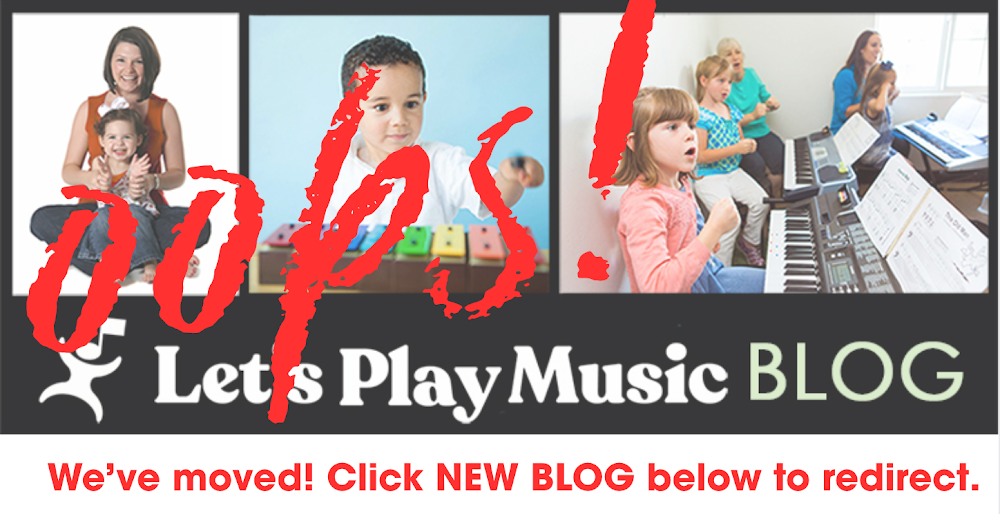I've been thinking about quality amid the holiday season. The flashy sales are all around, tempting me to buy all sorts of stuff at a super-discount price. But wait a minute, is this stuff really what I want? Maybe I should examine it a little more carefully first.
 |
| Do I really want this stuff? |
Has your kiddo ever begged for something that looked tempting and pretty in its packaging, but it fell apart after she played with it a few times? Perhaps that super-saver-discount deal was no deal at all. We don't want to get bamboozled into buying junk. We want to invest our time and money in quality items and experiences. (Read our post on Smarter Spending to maximize happiness this season.)
That applies to shopping for gifts and investing in your music classes!
Cheap Toys vs. Quality Toys
 |
| Broken already? |
When you buy toys for your children, you'll be able to find quality items by considering:
- Does the toy have open-ended play possibilities? Open-ended toys get played with imaginatively as your child invents new scenarios. Specialized toys leave less room for imagination and tend to becoming boring quickly.
- Is it durable and safe? Can it handle rough play? If it is going to get tossed out next week, why buy it in the first place? Well-made toys have better resale potential, too!
- Is the item a pleasure to look at and handle?
- Does it match your child's interests? Quality toys can often be used by children of various ages, in various scenarios, and maintain interest for years.
- Consider buying fewer items, but get high-quality ones you really want.
 |
| Music toys can offer creative play if you teach your child to be inventive with music. |
Don't forget to consider toys as an experience. A key point from our article on smart spending is to focus on experiences. A toy that you plan to use as a launching point for spending with your child (musical instruments you'll play together, a craft you'll do together, etc.) will have special meaning. Don't forget to follow through and spend the time together.
If you'd like some musical gift ideas, check out our musical Gift-Giving Guide. Don't forget that enjoying these gifts with your child is the best part of the gift.
Quality Experiences?
At Let's Play Music, we don't sell toys. We deliver a high-quality musical education. You're a savvy shopper and carefully choose how you spend your time and money on experiences for your family. Here are questions you'll want to ask about any program you enroll your child in:
- Does the program train the teachers? At LPM, our teachers attend training for each year of curriculum, where they learn the games and songs as well as philosophies and reasons behind the games. At training, new teachers demonstrate that they can accurately lead our activities and accurately explain the theory.
- Does the program have a certification process? After teachers are trained, how can you be sure they stay true to the vision? At LPM, teachers have videos of their classes reviewed regularly to achieve and maintain certification year after year.
- Do the teachers have a network of support? How do teachers get ideas and solve problems? At LPM, we have an extensive support network: each teacher has a training team of our executives backing her up, as well as a huge network of other LPM teachers in constant online communication for support. Most teachers attend our annual teacher meeting for further education and training.

Teachers from around the country came together for the 2015 LPM Symposium - Do you agree with the program's values and philosophies? Whether it's soccer, karate, or music, find out what defines the program and sets it apart from your other options. I love that the LPM philosophies are based on research about how and when children learn music best. Browse through our blog posts and our website to learn more about us.
- Consider pursuing fewer activities but choose ones that are high-quality and important to your child's development now. Give the activity enough focus and attention to really make it successful. The LPM curriculum gives your child a musical foundation (preparatory to any musical study) that will have a powerful and specific impact specifically during these formative years. Get the most from the program by attending 100%, doing homework, practicing, and making it an experience with your child! In our post on abundance, some families shared that they can't do it all right now, but their child does get to experience a lot over the years of childhood.
Wherever You Go
I appreciate that the Let's Play Music program is high-quality and consistent everywhere. I had a student move mid-semester to another state. Happily, he found a new LPM teacher, so after taking Yellow Lesson 4 with me was able to move across the country and take Yellow Lesson 5 from his new teacher without missing a beat.
I've also had emergencies when I couldn't teach, and had another LPM teacher substitute for me. She knows exactly what will be needed to teach Purple Lesson 12, to answer my students' theory questions, and to help them with the tricky parts of the song they're working on. She's been through training, been certified, and is up-to-date on the always-improving curriculum and teaching methods.
As you go shopping this season, remember to look for quality in the objects you bring into your home, and quality in the programs you invest your time in.
-Gina Weibel, M.S.
Let's Play Music Teacher








